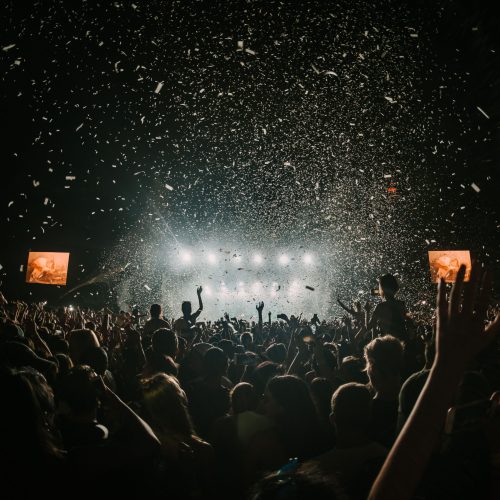I’m writing this from a coffee shop in Nashville.
The playlist that the baristas have been playing has taken me on an emotional rollercoaster. In the last 20 minutes, we’ve gone from Zac Brown’s “Chicken Fried” to Billie Eilish’s “when the party’s over.” I think they’re playing Counting Crows now, but I can’t be sure because I only know that one song they recorded for Shrek 2.
If you go anywhere in the city – bars to baseball fields, clothing stores to doctors’ offices – you’re unlikely to find a place that’s completely void of music. It’s almost like the last 70 years of western progress have been one big attempt to underscore our every breath. And it’s worked. We’ve been surrounded.
But why did it work? Why do we love music so much?
To answer that, I’ll have to zoom out even further…
Why does music even exist?
History is very rarely unanimous. There aren’t many things that 21st century AD Swedes have in common with 10th century BC Egyptians. But every human society, from the earliest to now, has had two basic methods of communicating with each other: language and art.
There’s some gray area in that distinction, but this is how I think about it. Language is our mechanism for communicating ideas to each other. It enables us to think together, to share what we’ve learned from our own experiences in order to contribute to the group’s collective knowledge. Art, on the other hand, is our mechanism for communicating emotions to each other. It lets us feel together, to share in each other’s joys and sorrows and angers, which serves the cohesion of the group as a concrete expression of its temperament.
I’ll say it again: language is for ideas. Art is for emotions.
And music is a form of art that is found in every culture in history.
I think we (definitely me, and probably you, too) take for granted how unusual and significant this is. Most animals have a simple form of language. Some of their languages (like birds and whales) even resemble what we call “songs.” But no other animal, besides humans, communicate complex emotion through the creation of art. We’re the only ones.
Now, this is probably a bit of a “chicken and egg” situation. I don’t know if humans are different from all other animals because of our capacity for art, or if we have a capacity for art because we’re different from all other animals. But no matter the order, it seems clear that the two are at least correlated. Art – including music – is central to being human.
Now let’s zoom back in…
Why do we love music so much?
Humans are over-the-top social creatures. We thrive in community and suffer in isolation. More specifically, we thrive when we can be completely ourselves in community, and suffer when we completely lose touch with ourselves in isolation. It’s the reason solitary confinement is used as a punishment in most cultures, and it’s the reason therapy works. We don’t just need to feel things; we need to feel things together.
Art acts as a binding agent for community, because it creates space for people to feel things together. And music is a particularly important form of art for a few reasons, the main one being that, unlike a painting or a novel, it can easily be experienced by a large group of people at once, since it travels through the air, not on a cave wall or a piece of paper. Hearing is much harder to block than sight.
If you don’t know what I mean, just go to an art gallery, and then go to a Coldplay concert. The emotion communicated by a painting might be as potent as the sadness in “Fix You,” but stadiums aren’t built for people to gather around paintings.
Now, allow me to guess what you’re thinking…
Why does this matter?
Glad you asked. I have a few reasons.
First, if you’re a songwriter or a musician, it gives you a reason to do what you do, which will make you better at what you do. Art is better when it’s done with intention. When I write songs, I try to ask myself point-blank, “What emotion am I feeling that I want my listeners to share with me?” From there, I’ve found that the best songs I’ve written (which are also usually the ones people like the most) are the ones that are truest to my own experience. Anybody can write a vague song about a vague emotion. But it takes more skill and courage to write a song from a personal, honest space.
And those are the songs that last.
Second, even if you’re not musical and you just stumbled on this article, you probably consume music on a regular basis. I’m a firm believer that what we consume makes us who we are. You are what you eat, but you also are what you listen to, read, see, and watch. So, make sure you’re consuming the good stuff. A lot of music consumption is taste-based, and it’s hard to call songs objectively good or bad. But I also think many of us use this as an excuse for listening to shallow music that communicates broad emotion. We usually don’t try very hard to look for the best stuff. But what if, before we listened to a song, we asked ourselves “What emotion is this artist trying to share with me?”
Might we learn to let music do more for us than simply underscore our lives? Could we actually let music make us more vulnerable, empathetic, and honest people?
I think so.







